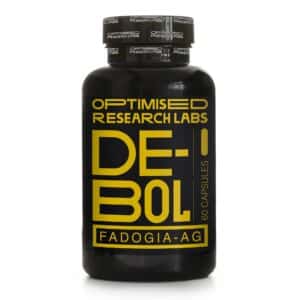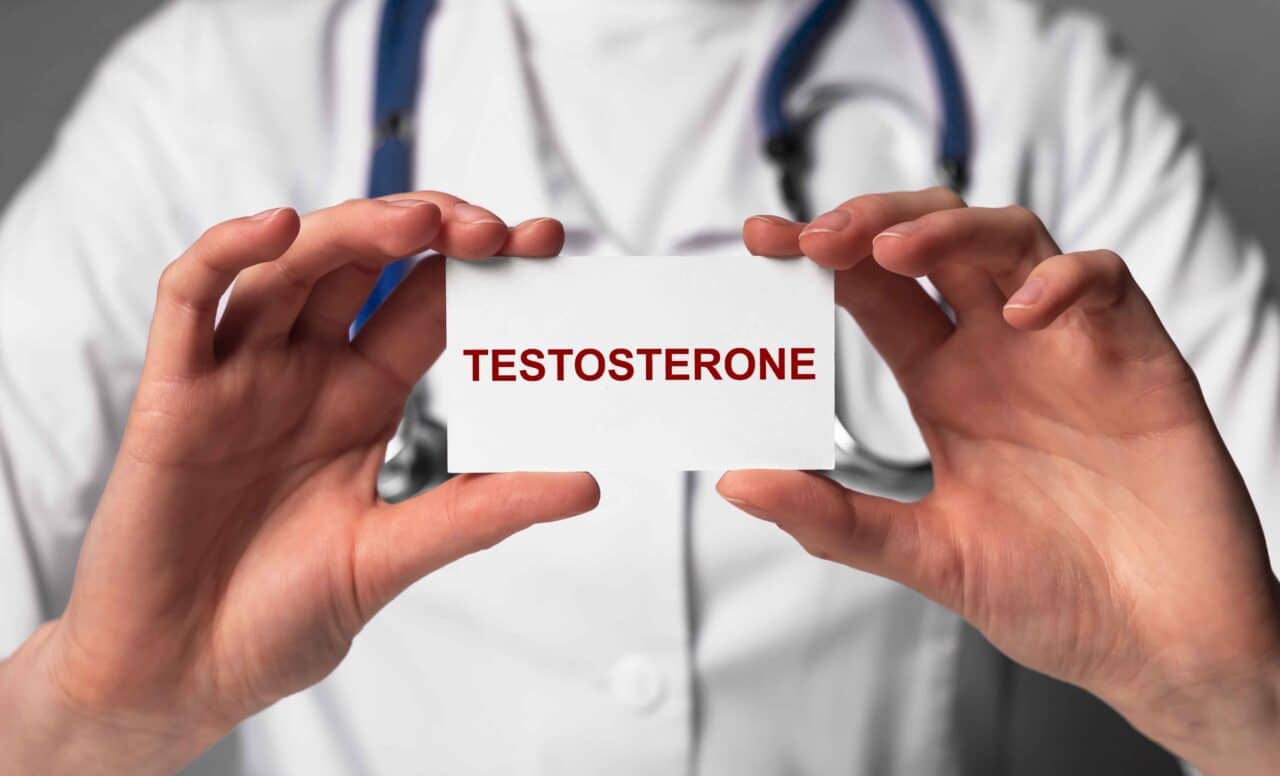What is Fadogia Agrestis?
Here at Optimised Research Labs, we pride ourselves on employing the findings of the latest cutting-edge research to produce the most effective, state-of-the-art, evidence-based products. Our research team constantly monitors the development of the very latest and most innovative ergogenic and health promoting substances and the research that demonstrates their beneficial effects. Sometimes, however, in order to move forward, we need to look back, as modern science demonstrates the benefits of substances that have been used for hundreds, and sometimes even thousands, of years by indigenous people all over the world to benefit their health, vitality and performance. One such substance is Fadogia Agrestis.
What is Fadogia Agrestis?
Fadogia Agrestis, also known as bakin gagai (Hausa) or black aphrodisiac, is a short flowering bush that belongs to the Rubiaceae family. This includes plants such as evergreen trees, shrubs, and herbs. Although it is native to Nigeria, it can also be found as far west as Ghana and as far east as Sudan. It has a rich history of use in traditional African medicine, where it has been prized for its aphrodisiac, analgesic, anti-inflammatory, and testosterone boosting effects. It was commonly used to improve male fertility, sperm count, and motility and treat erectile dysfunction and other problems related to sexual performance and libido. It may have also been used to reduce kidney pain, relieve fevers, general fatigue, and for its diuretic effects. The knowledge of Fadogia Agrestis has now spread far beyond Africa, leading to increased interest and research into its potential benefits.
What are the benefits of Fadogia Agrestis?
Fadogia Agrestis has been shown scientifically to provide a wide range of benefits for health and performance. These include:
- Increasing Testosterone (3)
- Enhancing sexual health, performance and function (3,5)
- Reducing pain and inflammation (6)
- Helping to control blood glucose levels (7)
What does ORL Fadogia Agrestis contain?
ORL Fadogia Agrestis contains a specially formulated combination of premium grade Fadogia Agrestis and Piperine.

What does the science say about Fadogia Agrestis?
While Fadogia Agrestis been used for centuries in traditional medicine with much anecdotal evidence to support its effectiveness, modern science has only recently begun to investigate its use with very promising results. As we review a selection of that research, you will begin to see why Fadogia Agrestis is such an effective product and how it may benefit you.

Can Fadogia Agrestis increase testosterone?
One of the most notable benefits of Fadogia Agrestis is its potential to support hormonal health, particularly in men, by increasing testosterone levels.
Testosterone is a powerful naturally occurring steroid hormone and the most important androgen (male sex hormone). It has a number of anabolic effects including directly increasing muscle mass and strength and stimulating the release of growth hormone.
It also plays an important role in general health and well-being, as it contributes to bone density and strength, the production of red blood cells, reproductive health (sperm production), libido, heart health and cognitive function. Testosterone also helps us to maintain a healthy body composition, as it not only contributes to the development and maintenance of muscle, but also enhances fat metabolism to help us to stay leaner.
However, there is growing concern in the medical and scientific communities regarding declining testosterone levels in men, which have shown a significant and steady decrease from the 1970s until the present time (1,2).
This decline appears to have been particularly rapid in the last two decades, as men’s levels have dropped 20% in 20 years, with an increasing number of younger men now suffering the effects of low testosterone (1).
This led to the investigation of various natural supplements, including Fadogia Agrestis to address this problem.
The results of a study conducted on rodent subjects by Yakubu et al., (3), showed that supplementing with Fadogia Agrestis for just five days produced impressive increases in testosterone, as levels increased in a dose-dependent way by 2-fold, 3-fold, and 6-fold when the subjects were given 18 mg/kg, 50 mg/kg, and 100 mg/kg of Fadogia Agrestis.
It is believed that Fadogia Agrestis stimulates the release of luteinizing hormone, which promotes the production of testosterone.
Based on these results, Fadogia Agrestis appears to be one of the most potent options for increasing testosterone, demonstrating greater effect sizes, in comparison to other herbs known for their testosterone-boosting effects.

Fadogia Agrestis and muscle mass and strength
While there are currently no direct clinical trials that have investigated the effects of Fadogia Agrestis on muscle mass and strength, it is important to understand just how powerful the influence of testosterone is on these. This is exemplified by a study by Bhasin and colleagues (4). 43 men were randomly assigned to one of four groups: placebo with no exercise; testosterone with no exercise; placebo plus resistance training 3 times per week exercise; and testosterone plus resistance training 3 times per week exercise. The men received injections of 600 mg of testosterone or placebo weekly for 10 weeks. As you might expect, the results showed that those receiving testosterone and resistance training achieved the greatest increases in muscle mass and strength. However, those subjects receiving testosterone but not exercising made greater gains in muscle strength and size than those subjects who exercised and were given a placebo.
With this in mind, it would be reasonable to suggest that as Fadogia Agrestis has been shown to increase testosterone, it would lead to increases muscle size and strength when combined with a suitable resistance training programme.
Can Fadogia Agrestis increase libido and sexual function?
One of the key uses of Fadogia Agrestis in traditional African medicine is to increase libido and sexual performance and enhance overall sexual health. The results of a number of studies provide evidence to support this use.
The results of one study (3) found that supplementation with Fadogia Agrestis in rodent subjects resulted in a significant increase in sexual activity, and prolonged the period between the initiation of sexual activity to ejaculation significantly.
It appears that Fadogia Agrestis’s aphrodisiac effects may, in part, be due to its ability to improve vasodilation (i.e., widening of the of blood vessels), and blood flow by increasing nitric oxide levels. This is a molecule formed from the amino acid arginine, nitrogen, oxygen and several other substances, which causes vasodilation by relaxing the smooth muscle in the walls of the blood vessels. Insufficient levels of nitric oxide have a negative effect on penile erection resulting in erectile dysfunction.
A study by Ogunro and Yakubu (5) found that supplementation with Fadogia Agrestis restored the nitric oxide pathway and erectile dysfunction associated key enzymes in the penile and testicular tissues of male rodent subjects with chemically induced erectile dysfunction. In light of these findings, the authors suggest that Fadogia Agrestis could be used in the management of erectile dysfunction.
It is important to note that nitric oxide is not only essential for male sexual function, but also plays an essential role in multiple physiological processes, ranging from immunity to nerve function. For example, it helps to maintain healthy blood pressure and circulation, and relax the airways, which can be beneficial for conditions such as asthma.
Additionally, due to its ability to relax the blood vessels, nitric oxide is essential for the increase in blood into working muscles during exercise that is responsible for the phenomenon commonly referred to as the ‘pump’. Consequently, a reduction in nitric oxide availability can result in a variety of health problems including an increased risk of cardiovascular and have a negative impact on exercise performance.

Can Fadogia Agrestis reduce pain and inflammation?
Exercise provides many benefits, but if you train for long enough and hard enough you are likely to experience a degree of pain and inflammation. This may be due to an injury or the natural consequence of post-exercise muscle soreness, commonly referred to as DOMS (delayed onset muscle soreness).
Post-exercise inflammation associated with DOMS is a natural response to the microscopic damage caused to muscle fibres and connective tissues during physical activity. While the pain is due to the inflammatory response and the repair process of the damaged tissues. Although pain and inflammation are normal responses and usually resolve within a few days, if they are excessive or prolonged, they can increase the recovery needed between workouts, which in turn inhibits the ability to train.
Consequently, various techniques are commonly employed to manage pain and inflammation, such as applying ice packs, massage, and taking over-the-counter painkillers or anti-inflammatory medication, which are not always suitable for everyone and can be associated negative effects such as digestive issues and kidney problems.
Evidence is emerging that supports traditional medicine’s use of Fadogia Agrestis to relieve inflammation and pain. For example, Oyekunle and colleagues (6) found that supplementation with Fadogia Agrestis not only provided a significant reduction in pain in comparison to a control but also provided a powerful anti-inflammatory effect with a potency comparable with that of the reference analgesic anti-inflammatory drug, Aspirin.
Can Fadogia Agrestis improve carbohydrate metabolism?
Glucose is the body’s preferred fuel and is the predominant energy source for high intensity exercise. It also plays a major role in fuelling endurance activities. In order for glucose to fuel activity and to prevent it from contributing to our fat stores, we need to ensure that it is metabolised effectively by the body. Unfortunately, a growing number of people experience issues with poor glucose metabolism, leading to conditions such as type 2 diabetes and obesity and their many associated health problems.
Although various options exist for the management of diabetes, these are not without problems such as limited and decreased efficacy over time, ineffectiveness against some long-term diabetic complications, poor cost-effectiveness, worsening of heart diseases, increased body weight and hypoglycaemia (7). Consequently, the development of natural plant-based treatments that are not associated with such issues would be highly beneficial.
To this end, Yakubu and Ogunro (7) investigated the effects of Fadogia Agrestis on diabetes. Rodent subjects had diabetes induced chemically, which resulted in a number of adverse effects including an increase in the levels of glucose and unhealthy blood fats. The results showed that supplementation with Fadogia Agrestis reversed all of these negative effects significantly. In light of these findings, the authors suggest Fadogia Agrestis shows promise as an antidiabetic agent.

Fadogia Agrestis and exercise performance
While Fadogia Agrestis is an emerging supplement with many of its beneficial effects still to be discovered, the existing evidence suggests that it has the potential to improve exercise performance in a number of ways. Firstly, testosterone plays a vital role in muscle growth and recovery. Therefore, by increasing testosterone levels, Fadogia Agrestis may enhance these processes. In addition, Fadogia Agrestis possesses anti-inflammatory, antioxidant and pain-relieving properties, which may aid post-exercise recovery by reducing the inflammation, oxidative stress and soreness that are common after intense exercise.
How does Fadogia Agrestis work?
Although the exact mechanisms responsible for Fadogia Agrestis’s beneficial effects are still are still not fully understood, a number of key bioactive compounds have been identified with potent health and fitness enhancing properties.
These include:
- Glycosides
Glycosides are a diverse group of compounds found in plants, which offer a range of benefits for health, including antioxidant, anti-bacterial, anti-viral and anti-inflammatory effects and potentially enhance cardiovascular and digestive health. It is believed that glycosides are responsible for Fadogia Agrestis’s testosterone-enhancing effects.
- Coumarin
Coumarin is a natural chemical compound found in many plants. It possesses antioxidant, anti-bacterial, anti-viral, anti-inflammatory and anti-coagulant effects.
- Flavonoids
Flavonoids are a type of polyphenol. These are plant compounds that give colour to fruit, vegetables and flowers. They provide a range of health and fitness benefits due to their antioxidant, anti-inflammatory, and heart-protective properties. These include reducing oxidative stress and inflammation, improving blood vessel function, and enhancing recovery and endurance.
- Lignans
Lignans are naturally occurring compounds which have been found to have a number benefits for health and performance. These include antioxidant and anti-inflammatory effects. They may also enhance cardiovascular and digestive health.
- Phytosterols
Phytosterols, also known as plant sterols or stanols, are natural compounds found in plant-based foods like nuts, seeds, and grains. They have been shown to lower LDL (unhealthy) cholesterol, help control blood glucose, support immune function, and reduce inflammation.
- Triterpenoids
Triterpenoids are a large and diverse group of naturally occurring compounds produced by plants, which are involved in growth and development and optimise the interaction between plants and their environment. They are known for their wide range of health benefits due to their anti-inflammatory, antimicrobial, antioxidant, and immune-boosting properties.
What is Piperine?
Piperine is a substance derived from black pepper. It has a long history of use in traditional medicine, where its primary role is to enhance the bioavailability of other compounds, allowing them to be more easily absorbed by the body. For example, one study found that piperine boosts the absorption of curcumin (main constituent of turmeric powder) by up to 2000% (8).

Summary
Fadogia Agrestis has a rich history of use in traditional African medicine, where it has been prized for centuries for its aphrodisiac, analgesic, anti-inflammatory, and testosterone boosting effects, and used to treat a diverse range of conditions, with much anecdotal evidence to support its effectiveness. The knowledge of Fadogia Agrestis has now spread far beyond Africa, leading to increased interest and scientific investigation into its benefits, with very promising results. These show that it not only has the potential to improve various aspects of health, but also performance.
ORL Fadogia Agrestis is of the highest quality. It has been meticulously sourced from the select regions in Africa and has been formulated to deliver optimal potency. It also benefits from the addition of Piperine to enhance its bioavailability. This combination helps to ensure maximal efficacy for boosting testosterone levels, enhancing muscle growth, and promoting faster recovery. In the field of sport and exercise this is an emerging supplement, which we are sure will have a big future as the word of its benefits spread.

